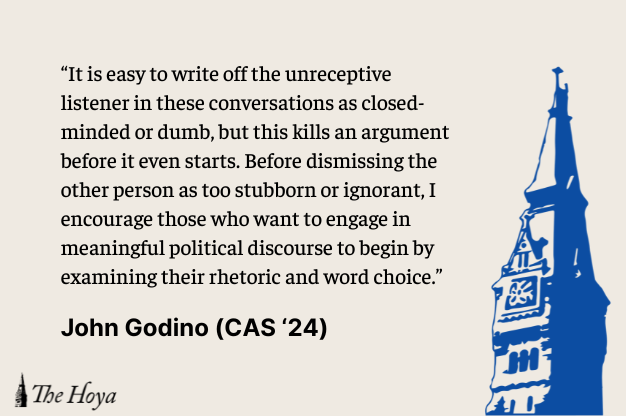We are currently in an age of extreme political polarization where each side is becoming more and more frustrated with the other. Social media encourages people to burrow further into their own echo chambers and confirms their every bias, with nothing to point out blind spots. This has made almost any discussion around politics exceedingly charged, with people constantly primed to write off anyone who disagrees with them. This is partly due to real ideological differences between people, but it is also due to how we are talking to one another.
Many people are left bewildered when their message falls flat, often due to one critical mistake: an inability to adapt to their audience. An orator who speaks in the same way to every audience regardless of the composition of their listeners is not going to be an effective speaker — their own avoidable mistake.
It is the speaker’s responsibility to take the rhetorical situation into account and match their content to their audience. The rhetorical situation consists of five different parts: the speaker’s identity, the audience’s identity, the issue being discussed, the speech’s setting and the speech’s content. Georgetown University students who want to become effective orators must realize that all of these aspects affect each other in different ways and communicate their message in a manner that suits the given audience and issue.
Everyone has had those frustrating conversations — conversations where it feels like no argument gets through to the other person no matter the force of logic or facts, no matter how clear and obvious the point — for whatever reason, the listener just refuses to see it as correct.
It is easy to write off the unreceptive listener in these conversations as closed-minded or dumb, but this kills an argument before it even starts. Before dismissing the other person as too stubborn or ignorant, I encourage those who want to engage in meaningful political discourse to begin by examining their rhetoric and word choice.
Don’t worry, I am not going to tell you to be nicer to people or that civility is dead. Those appeals might be more digestible, but current polarization cannot be solved purely with niceties and platitudes. Instead, it requires a reframing of rhetorical strategies when talking to those who disagree.
I’ll spare you a deep dive into the structure of the rhetorical situation and just discuss a few ways to use it to become a more effective communicator.
First, the most important thing to remember before addressing an audience is that unless you are walking onstage with instantly recognizable credentials like a prestigious degree or an important job title, you have to earn the audience’s trust by building credibility for yourself. Be humble. Don’t assume that you are recognized as an authority or that your audience will automatically believe you, because in a lot of cases, neither of those things are a given. A good way to build a little bit of credibility straight away is through self-awareness. If it is abundantly clear that you disagree with your audience or are not on their side, point it out and don’t be afraid to make a light, self-deprecating joke. This is an early sign of honesty that will keep a listener’s ears open for a little longer, even if they assume they are ultimately going to disagree. Your first argument is not what you’re saying, but whether or not you can be trusted.
Next, you have to think about the discourse and controversy surrounding the issue you are talking about, especially when it directly relates to your audience.
No one is going to be receptive to a speaker who makes light of an emotionally-charged situation, or, on the other hand, is completely out of touch with how much something matters to their audience. Audiences like to feel like they are right, and if they feel strongly that something is of great importance, matching their energy is essential.
Third, you must show that you understand their hesitancy toward your argument.
This is where listening to the audience’s concerns is vital.
While it can be difficult to comprehend why someone disagrees with something you find perfectly reasonable, effective communicators show that they understand their audience’s concerns. This demonstrates that you have thought deeply about the issue and are taking the audience’s reservations seriously.
People like to feel right and do not like to be told they are wrong, and by sympathizing with their concerns, you validate this underlying desire to be correct. By acknowledging the concerns of your audience, you build trust that can be later used to your advantage when you start arguing against them.
While these strategies can only go so far — as some audiences simply cannot be swayed — they are essential to fostering essential speaking skills. Especially at Georgetown, where many students dream of working in public service, being effective communicators will only help us both at school and in our careers. Easing current polarization is going to require a give and take. And while no one should betray their beliefs in order to win over an audience, meeting people where they are will always be the most effective strategy for facilitating a productive discourse.
John Godino is a senior in the College of Arts & Sciences.














